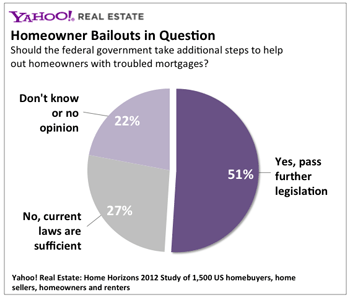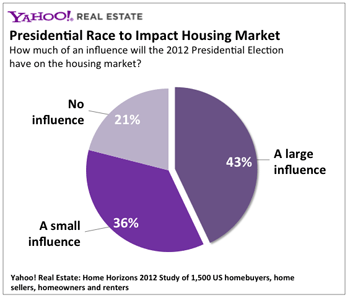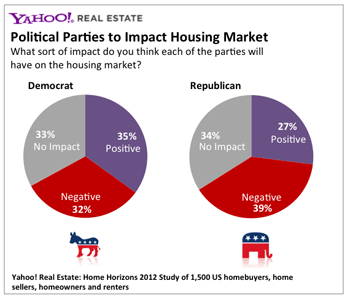On the brink of a Presidential Election year, a majority of American adults believe that the federal government should do more to assist homeowners, many of whom have troubled mortgages or are teetering on foreclosure or bankruptcy.
That’s a key finding of a Yahoo! Real Estate survey of 1,500 current and aspiring homeowners, fielded in October. The study, known as Home Horizons 2012, was mapped to the U.S. adult population of homeowners and renters.
 |
Altogether, 51% of American adults agree that the government should do more to rescue homeowners at risk of losing their mortgage, while 27% disagree and 22% don’t have an opinion. Among those with opinions on the matter, about two-thirds believe the government should offer additional assistance such as low-cost loans.
The study also finds that four out of five adults believe that the 2012 Presidential Election will have either a small or large influence on the housing market. Altogether, 43% of respondents believe that the national election will have a large influence on the housing market.
Neither major political party fares especially well in the study with regard to perceptions of the impact that either may make on the troubled housing market. One third of respondents said neither party would make either a positive or negative impact on the housing market.
 |
However, more adult respondents stated that Republicans’ impact on the housing market would be negative, at 39%, edging the Democrats’ negative numbers at 32%. Accordingly, Democrats’ also scored higher positive numbers, 35% to the Republicans’ 27%.
With 11 months left until national elections, the troubled housing market is not front-and-center either in Republican debates or in Obama administration talking points. Congress, obsessed with budget deficits, appears to be experiencing bailout fatigue.
Seeking Help
Meanwhile, the housing crisis is still grim in some areas, particularly where high unemployment is the status quo. Although housing prices have stabilized in many parts of the country, it’s also true that home prices are still sinking in many cities such as Las Vegas, Nev., putting significant pressure on homeowners with negative equity.
 |
The National Association of Realtors (NAR), a powerful industry trade group, favors government intervention. “Helping even more families stay current on their mortgage and remain in their homes will continue to reduce the negative impact of foreclosures on families and communities and aid in the recovery,” a spokeswoman told Yahoo! Real Estate.
According to Stan Humphries, Chief Economist at Zillow, “28.6% of single-family homes with mortgages are in a negative equity position. That’s about 15 or 16 million,” mortgages that may need assistance. But, he adds, “There’s no silver bullet to knock out negative equity.”
Humphries favors “options that keep the current owner in the house.” To that end, he contends that private investors have options that Fannie Mae and Freddie Mac might not be able to implement such as principle write-downs, renegotiating the terms of a mortgage to a lower rate, or in some cases renting out a house to current owner directly.”
What’s in Place
To date, the federal government has enacted two key laws to help homeowners with troubled mortgages refinance to more manageable payments:
- The Home Affordable Foreclosure Avoidance Program (HAFA) is designed to help streamline the short-sale process; and
- The Home Affordable Refinance Program (HARP) helps underwater homeowners avoid foreclosure by refinancing their mortgage to make it more affordable. But, the recently revised HARP 2 is only available for refinances of Fannie Mae and Freddie Mac held loans, according to NAR.
Is the program working effectively? Since 2008 there have been 4.02 million foreclosure sales, according to LPS Applied Analytics, but another eight million home mortgages are at risk according to a recent Bank of America report.
Still, through the third quarter of this year, the Federal Finance Housing Agency reports that it has “completed nearly 2 million foreclosure prevention actions,” of which “nearly 1.7 million … have allowed borrowers to retain homeownership, with more than one million being permanent loan modifications.”
But not everyone is happy about it. “The situation would be much worse if none of those programs or efforts had been tried,” contends Bruce Hahn, president of the Grassroots Alliance, an advocacy group in Arlington, Va. “But we still have an extremely serious problem. We need something more dramatic – a game changer.”
No Bottom Yet
Housing could take on a larger role in the 2012 national political debate if potential voters such as Bonnie, a renter in Kansas City, Mo., who is not in the market to buy a home, makes her voice heard. “I think homeowners should have a chance to keep their home, like lower payments etc.,” she says. “No one should be homeless or have to live in their cars. After all, we're supposed to be a rich country. We send money to other countries and that's okay, but I believe charity begins at home.”
Despite the passions of the electorate, there is no consensus political solution to the mortgage crisis. “A large-scale government policy that’s going to fix all of this – no one has seen such a thing,” says Zillow’s Humphries. “Stabilization in home prices and then a slow upward movement in prices to work down negative equity – that’s a multiyear affair.”
And homeowner bailouts may not appeal to the mortgage industry. “You’ve had many programs put in place to curb foreclosures and they really haven’t worked,” said Michelle Meyer, a senior economist at Bank of America Merrill Lynch, appearing as a guest on a Bloomberg program earlier this month. “You have a serious problem in the housing market that just needs to be worked out over time.”
Meyer sees no housing recovery on the horizon: “It will be hard for prices not to fall further – I would say another 5% decline from here on a national basis.” Paradoxically, if Meyer’s pessimistic forecast comes true, many more homeowners will demand mortgage relief programs from the federal government in 2012.
Though a thriving housing market recovery would appear to serve everyone’s interests, there are competing views about how to reverse the fortunes of this vital industry. Political solutions may be hard to come by, especially in an election year in which the presidency and possession of both houses of Congress are at stake.




No comments:
Post a Comment